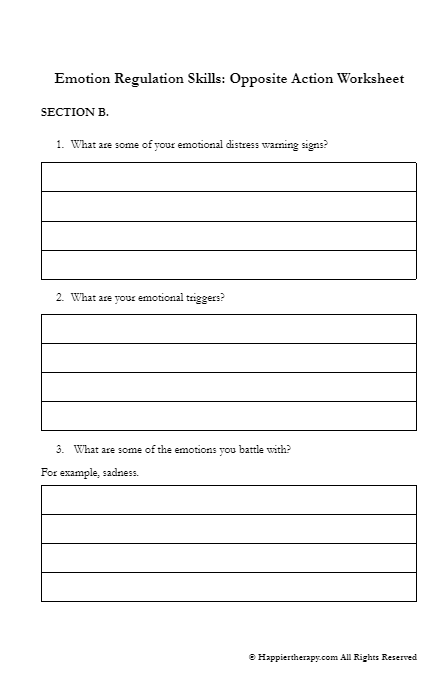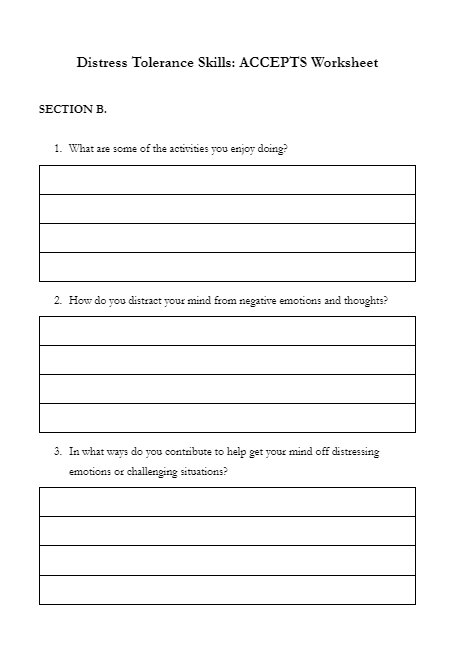Emotion Regulation Ride the Wave DBT Worksheet
 By
Dr Sabina Alispahic (PhD)
| Reviewed by
Dr Sabina Alispahic (PhD)
By
Dr Sabina Alispahic (PhD)
| Reviewed by
Dr Sabina Alispahic (PhD)
The contents of this article are fact-based except otherwise stated within the article.
Author bio
Dr Sabina Alispahic, PhD, is a psychologist and gestalt psychotherapist with expertise in clinical and health psychology.
Dr Sabina Alispahic’s Highlights:
- Associate Professor at the University of Sarajevo for the past 12 years
- PhD in psychology at the University of Zagreb
- European Certificate of Psychotherapy
Professional experience
Dr Alispahic pioneered innovative teaching methods as an associate professor of clinical and health psychology, inspiring a new generation of mental health professionals while contributing to the field for over 12 years. Also, she empowered individuals across the globe as an online psychotherapist, delivering life-changing therapy and earning a reputation for compassionate care and exceptional results. She has demonstrated expertise in a range of therapeutic approaches (CBT, ACT, Gestalt, mindfulness, and family constellations).
Certifications
European Certificate of Psychotherapy (Education in Gestalt Psychotherapy Training of the Malta Institute)
Eight-week stress reduction mindfulness programme, Society of Psychologists in the Federation of Bosnia and Herzegovina
Education
2009-2013 University of Zagreb, Faculty of Philosophy, Postgraduate Doctoral Studies in Psychology
2004-2008 University of Sarajevo, Faculty of Philosophy, Master Studies, Department of Psychology
Publications
Books
Alispahic. S. (2021). Selected topics from psychotherapy Sarajevo: TDP.
Alispahic. S. (2020). Online psychotherapy. Handbook for psychotherapists and clients Sarajevo: TDP.
Alispahic, S., and Godinjak, A. (2018). (R)evolution of the doctor-patient relationship. Sarajevo: TDP.
Alispahic, S. (2016). The psychology of pain Sarajevo: Faculty of Philosophy (e-publication, Bosnian language): https://ebooks.ff.unsa.ba/index.php/ebooks_ffunsa/catalog/book/29
Book chapters
Alispahic, S. (2018). Psychological Theory and Therapy of Traumatic Memory In: A. Hamburger (ur.), Trauma, Trust, and Memory: Social Trauma and Reconciliation in Psychoanalysis, Psychotherapy, and Cultural Memory, 23-35. London and New York: Routledge, Taylor & Francis Group.
Markovic Pavlovic, M., Alispahic, S., and Dautbegovic, A. (2015). Psychology of Nonkilling in Bosnia-Herzegovina. Knowledge and Attitudes of Students Towards Nonkilling Culture. In: R. Bahtijaragic i J. E. Pim (ur.), Nonkilling Balkans, 171-183. Honolulu: Centre for Global Nonkilling, and Sarajevo: Faculty of Philosophy.
Link: http://nonkilling.org/pdf/nkbalkans.pdf
Articles
Alispahic, S., & Alispahic, B. (2021). Definition of police psychology: The role of psychologists in the police. Technium Soc. Sci. J., 17, 235-244.
Link: https://techniumscience.com/index.php/socialsciences/article/view/2678
Alispahic, S., Hasanbegovic-Anic, E., & Tuce, Đ. (2021). Big Five Personality Traits as Predictors of Mindfulness: A Study on a Bosnian Sample. Epiphany, 14(1), 146-155.
Link: http://epiphany.ius.edu.ba/index.php/epiphany/article/view/357
Alispahic, S. & Hodžić Küreç, A. (2021). How does yoga affect health? Yoga teachers’ experiences. International Scientific Journal of Kinesiology, Vol. 12, 2, 135-140.
Hasanbegovic-Anic, E., Sandic, A., and Alispahic, S. (2018). Prevention of substance abuse in children and adolescents: an evidence-based practice approach. Epiphany, 11(1), 11-30.
Link: http://epiphany.ius.edu.ba/index.php/epiphany/article/view/280
Alispahic, S. and Hasanbegovic-Anic, E. (2017). Mindfulness: Age and Gender Differences in a Bosnian Sample. Psychological Thought, Vol. 10 (1), 155–166.
Hadziahmetovic, N., Alispahic, S., Tuce, Đ., i Hasanbegovic-Anic, E. (2016). Therapist interpersonal style and therapy benefit as determinants of client personality self-reports in Bosnia and Herzegovina. Vojnosanit Pregl, 73 (2): 135–145.
Alispahic, S., Hasanbegovic-Anic, E., Tuce, Đ., Hadziahmetovic, N., Sandic, A. (2014). Characteristics of Patients Involved in Psychotherapy in Bosnia and Herzegovina. Journal of Health Sciences, 4 (1): 4-6.
Link: https://www.jhsci.ba/ojs/index.php/jhsci/article/view/142
Alispahic, S. (2013). Motivational function of plans and goals. Psychological Thought, Vol. 6 (2), 96–203.
Link: https://www.researchgate.net/publication/258225796_Motivational_Function_of_Plans_and_Goals
Professional profiles
ResearchGate: https://www.researchgate.net/profile/Sabina-Alispahic
Google Scholar: https://scholar.google.com/citations?hl=hr&user=TnYiVK0AAAAJ
LinkedIn: https://www.linkedin.com/in/sabina-alispahić/
Reviewer bio
Dr Sabina Alispahic, PhD, is a psychologist and gestalt psychotherapist with expertise in clinical and health psychology.
Dr Sabina Alispahic’s Highlights:
- Associate Professor at the University of Sarajevo for the past 12 years
- PhD in psychology at the University of Zagreb
- European Certificate of Psychotherapy
Professional experience
Dr Alispahic pioneered innovative teaching methods as an associate professor of clinical and health psychology, inspiring a new generation of mental health professionals while contributing to the field for over 12 years. Also, she empowered individuals across the globe as an online psychotherapist, delivering life-changing therapy and earning a reputation for compassionate care and exceptional results. She has demonstrated expertise in a range of therapeutic approaches (CBT, ACT, Gestalt, mindfulness, and family constellations).
Certifications
European Certificate of Psychotherapy (Education in Gestalt Psychotherapy Training of the Malta Institute)
Eight-week stress reduction mindfulness programme, Society of Psychologists in the Federation of Bosnia and Herzegovina
Education
2009-2013 University of Zagreb, Faculty of Philosophy, Postgraduate Doctoral Studies in Psychology
2004-2008 University of Sarajevo, Faculty of Philosophy, Master Studies, Department of Psychology
Publications
Books
Alispahic. S. (2021). Selected topics from psychotherapy Sarajevo: TDP.
Alispahic. S. (2020). Online psychotherapy. Handbook for psychotherapists and clients Sarajevo: TDP.
Alispahic, S., and Godinjak, A. (2018). (R)evolution of the doctor-patient relationship. Sarajevo: TDP.
Alispahic, S. (2016). The psychology of pain Sarajevo: Faculty of Philosophy (e-publication, Bosnian language): https://ebooks.ff.unsa.ba/index.php/ebooks_ffunsa/catalog/book/29
Book chapters
Alispahic, S. (2018). Psychological Theory and Therapy of Traumatic Memory In: A. Hamburger (ur.), Trauma, Trust, and Memory: Social Trauma and Reconciliation in Psychoanalysis, Psychotherapy, and Cultural Memory, 23-35. London and New York: Routledge, Taylor & Francis Group.
Markovic Pavlovic, M., Alispahic, S., and Dautbegovic, A. (2015). Psychology of Nonkilling in Bosnia-Herzegovina. Knowledge and Attitudes of Students Towards Nonkilling Culture. In: R. Bahtijaragic i J. E. Pim (ur.), Nonkilling Balkans, 171-183. Honolulu: Centre for Global Nonkilling, and Sarajevo: Faculty of Philosophy.
Link: http://nonkilling.org/pdf/nkbalkans.pdf
Articles
Alispahic, S., & Alispahic, B. (2021). Definition of police psychology: The role of psychologists in the police. Technium Soc. Sci. J., 17, 235-244.
Link: https://techniumscience.com/index.php/socialsciences/article/view/2678
Alispahic, S., Hasanbegovic-Anic, E., & Tuce, Đ. (2021). Big Five Personality Traits as Predictors of Mindfulness: A Study on a Bosnian Sample. Epiphany, 14(1), 146-155.
Link: http://epiphany.ius.edu.ba/index.php/epiphany/article/view/357
Alispahic, S. & Hodžić Küreç, A. (2021). How does yoga affect health? Yoga teachers’ experiences. International Scientific Journal of Kinesiology, Vol. 12, 2, 135-140.
Hasanbegovic-Anic, E., Sandic, A., and Alispahic, S. (2018). Prevention of substance abuse in children and adolescents: an evidence-based practice approach. Epiphany, 11(1), 11-30.
Link: http://epiphany.ius.edu.ba/index.php/epiphany/article/view/280
Alispahic, S. and Hasanbegovic-Anic, E. (2017). Mindfulness: Age and Gender Differences in a Bosnian Sample. Psychological Thought, Vol. 10 (1), 155–166.
Hadziahmetovic, N., Alispahic, S., Tuce, Đ., i Hasanbegovic-Anic, E. (2016). Therapist interpersonal style and therapy benefit as determinants of client personality self-reports in Bosnia and Herzegovina. Vojnosanit Pregl, 73 (2): 135–145.
Alispahic, S., Hasanbegovic-Anic, E., Tuce, Đ., Hadziahmetovic, N., Sandic, A. (2014). Characteristics of Patients Involved in Psychotherapy in Bosnia and Herzegovina. Journal of Health Sciences, 4 (1): 4-6.
Link: https://www.jhsci.ba/ojs/index.php/jhsci/article/view/142
Alispahic, S. (2013). Motivational function of plans and goals. Psychological Thought, Vol. 6 (2), 96–203.
Link: https://www.researchgate.net/publication/258225796_Motivational_Function_of_Plans_and_Goals
Professional profiles
ResearchGate: https://www.researchgate.net/profile/Sabina-Alispahic
Google Scholar: https://scholar.google.com/citations?hl=hr&user=TnYiVK0AAAAJ
LinkedIn: https://www.linkedin.com/in/sabina-alispahić/
Download Worksheet
Video & audio overview of the worksheet
What is the theory behind this Emotion Regulation Ride the Wave DBT Worksheet?
“Ride the wave” is a concept used in emotion regulation training under Dialectical Behavioral Therapy (DBT) which teaches individuals to identify and accept negative emotions rather than fight them. It encourages individuals to sit with their negative and painful emotions till they pass instead of using ineffective coping strategies to get rid of them or trying to escape in some way.
How will the worksheet help?
The worksheet will help individuals through the process of riding their emotions to manage them. It will provide a step-by-step guide that individuals can use to control and manage their emotions by acknowledging and accepting them without judgment. It can serve as a useful reminder to practice it when needed.
How to use the worksheet?
This worksheet can be provided to clients seeking dialectical behavior therapy during sessions focused on emotional regulation skills. The worksheet can be used to help them understand the steps that are part of the “ride the wave” concept. You can instruct them to write down what they have understood about the process at the end of the worksheet.



